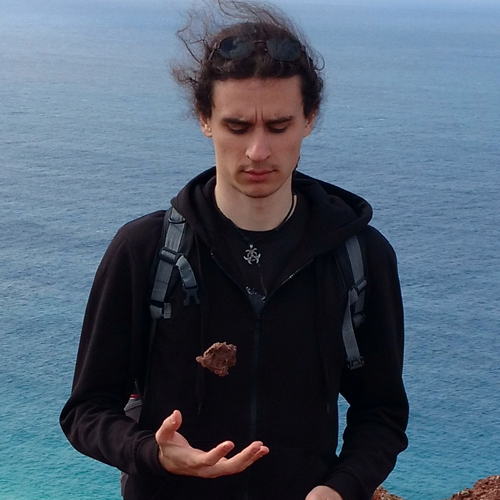Gorilla Group (Martha Robbins)
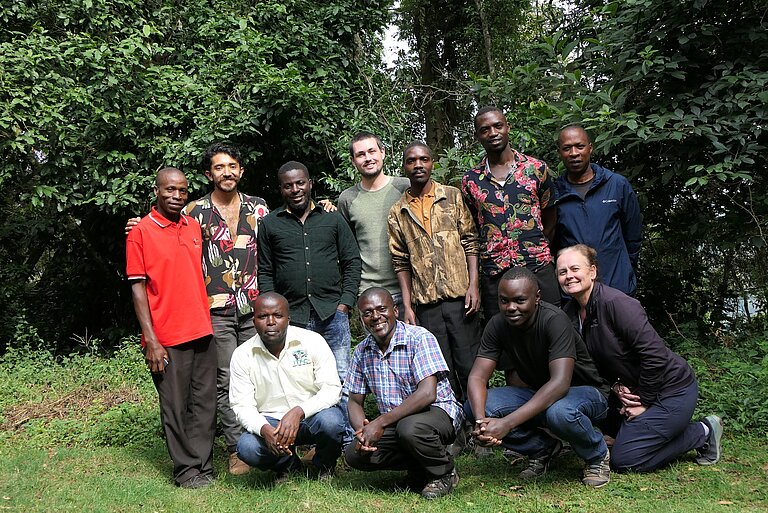
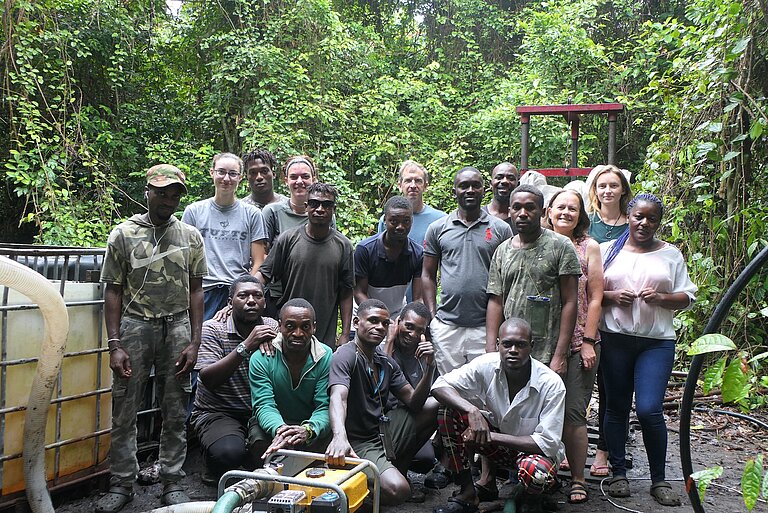
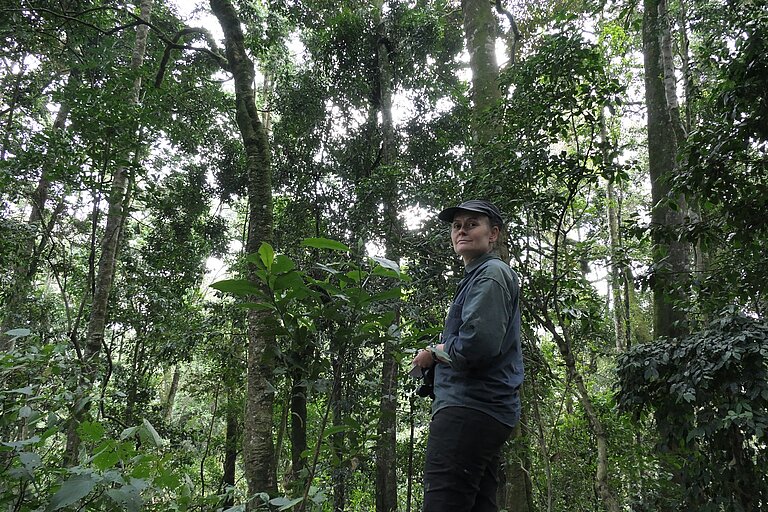
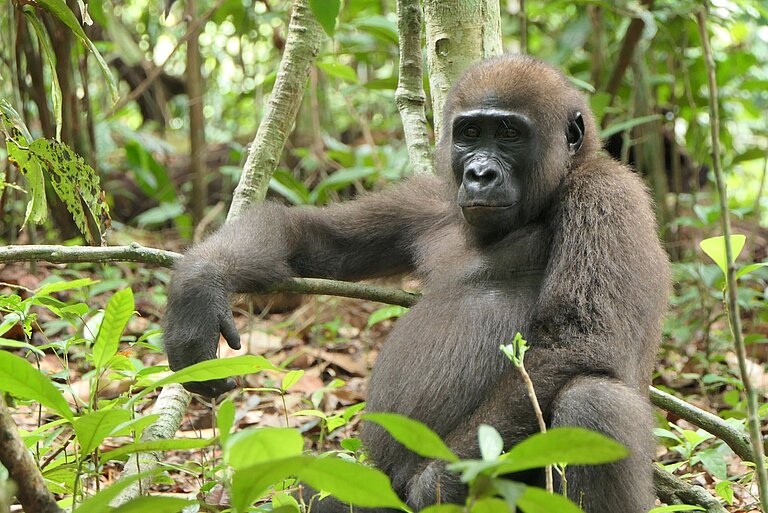
Description
The Gorilla Research Group focuses on the behavioral ecology of gorillas, including mountain gorillas in Uganda and western lowland gorillas in Gabon (see Bwindi Gorilla Project and Loango Gorilla Project in the field sites section, below). It focuses on the drivers of behavioral, ecological, and life history variability exhibited within and between gorilla populations and species, with the goal of understanding how these drivers influence the evolution of sociality. We use observational methods and census data to study social grouping, feeding ecology, and life history within populations, and comparative approaches to compare across sites (Bwindi and Loango, but also with collaborations of other long-term gorilla sites). The group also strives to conduct research and community projects that assist in the conservation of gorillas.
Projects
Social behavior: What are the causes and consequences of social relationships among gorilla group members? How does social behavior change during development?
Feeding Ecology: How does the diet of gorillas vary according to food availability? How does food availability influence ranging patterns and habitat utilization?
Reproductive Strategies and Social Behavior: What strategies are used by males and females to maximize their reproductive success? How do dispersal patterns influence social behavior and group dynamics? How do ecological conditions influence social relationships? How do social relationships vary among males and females?
Population Dynamics: How do populations change in size and structure over time? How do particular factors influence the changes in a population, in particular, the ecological conditions, levels of human disturbance, as well as intrinsic factors? How do life history variables differ among individuals and what impact does this have on reproductive success?
Genetics: In collaboration with genetics researchers in our department, we ask about how paternity, relatedness, and evolutionary genetic history are related to group size, structure, and behavior.
Staff
Acknowledgements
Acknowledgements for contributions to the Loango Gorilla Research Project
The Loango Gorilla Research Project is thankful for the work of many people, since the project began in 2005, under the directorship of Martha Robbins. To succeed, long-term behavioural research on the gorillas needs a large team with people working in multiple capacities. We would like to highlight and acknowledge the different areas of expertise that contribute to the success of the project and the people that have worked in each of them (* denotes people that have contributed in that capacity for >5 years, † denotes people that have contributed for >10 years):
Long-term Data Collection: The behavioural and ecological data makes up the backbone of our research. We would like to thank individuals that spent many tireless days in the forest collecting, rain or shine, muddy swamps and all, including: Chloé Amoo, Mary Jo Austin, Nyama Maya Yannick Aymar, François Baguette, Sarah Banet-Eugene, Jana Baumer, Jakob Beck, Isabella Bollini, Pierre Boukossou Floriane Brenet, Sean Brogan, Gabrielle Cottam, Josh Davis, Nausica de Gibert, Jhon Essongue, Lisa Faipoux, Emilie Fairet, Rumen Martin Fernandez, Tatiana Novoa Fonseca, Deborah Galeone, Joel Glick, Anne-Céline Granjon, Madison Grant, Beke Graw, Melanie Gregoire, Josephine Head (Bracewell)*, Dania Magaly Abizaid Herrera, Donna Honey, Luc Roquin Ivolou Ivolou, Katherine Judson, Bikanga Diboumba Aimé Juldas*, Joe Kelly, Basile Koumba, Mathilde Le Gressus, Solène Lehmann, Hermann Loundou*, Stefano Lucchesi, Loïc Mackaga*, Joris Taty Makoty†, Kelly Mannion, Tristan Maubec, Ismael Mavessy, Dimitri Mavoungou, Jean-Marie Moubouyou Jérome Moughala, Ulrich Moussouami, Finn Mueller, Lisa-Marie Newth, Herve Ngoundou, Yannick Nkoma, Glen Ntchoni ,Ghislain Ntete, Rony Nguimbi, Christopher Orbell, Jusslyn Oughendo, Brice Oughendo, Anna Preis, Luisa Rabanal, Lyndsay Rankin, Aimé Relonga, Kharl Remanda, Erick Reteno*, Jack Richardson, Frank Rokero, Carolyn Sanguinetti, Eliana Sonderling, Matthew Stritch, Kyle Sweeney, Nikki Tagg, Cristian Stephen Alverado Tamayo, Sander van Andel, Joost van Schijndel, Eric Vassey, Lauren Wiseman Jones, and Edward Wright
Tracking & Monitoring: Habituation, monitoring, and data collection on the gorillas would not be possible without finding them each day. We are extremely grateful for the skills, patience, and input from all the trackers from the Waka region who have helped make the project a success: Ayende Bayard, Bemba Martial, Boda Junior, (Petit) Diaradiloue Jean-Marie, Ekia Alphonse, Aloïse, Ghebogha Fidel, Ghekadi Antoine, Ghekoba Armand, Katy Jonas, Kombe Annicet, Kombe Judex, Kombe Justin, Kombi Jean-Aimé, Makosso Marc, Mapolo Emile, Massande Martial, Mateba Arnaud, Mateba Jerome, Mayikou Maurice, Mayumbo Samuel, Mboudi Pierre, Mibambo Doste, Mikodi Samuel, Mimanda Raphael, Missimbo Ambroise, Mogangue Donald, Mokambi Romain (Stevie), Mokouata Patrick, Mombo Aloise, Mondjo Jean-Pierre, Mondjo Alexis, Motendi Francois, Mouamba Leonel Richie, Ndoba Dominique, Ngadi Franck, Nzengue Jean- Réné, Nzengue (Ekoutou) Jean-Edouard, Ossaghou Faustin, Ngabe (Mbongo) Emile, Ramatoulay Jean-Jacques, Sabangui Philipe, Saboubanga Hervé, and Tombe Alphonse.
PhD Students: Seveal PhD students contributed to the fieldwork including Josephine Head, (Bracewell), Laura Hagemann, Nadege Freda Madinda, and Tanga Coch Tanguy Floyde
Project Management: A huge amount of logistics are behind the day-to-day running of a research project, supervision of staff and managing data collection. We would like to thank the project managers, who were available for anything 24/7, including Josephine Head, Christopher Orbell, Muriel Basile, Karsten Diercks, Sonia Domínguez Alba, Matthew Lewis, Koro Vogt, and Lorenzo Glave.
Database Management: Once data is collected it must be compiled and cleaned to be available for research. We would like to thank individuals that have been involved in database management including: Josephine Head, Jack Richardson, Martha Robbins† and Chris Young.
Logistical Support: We thank many people at the Wildlife Conservation Society who assisted with logistics, particularly Ruth Starkey, Narcisse Moukoumou, Mark Gately, Tomoaki Nishihara, Lee White, and Mike Fay. The project was initially a collaboration with the Société de Conservation et de Développement (SCD) and Africa’s Eden; their staff provided valuable assistance. We thank all the lodge managers who assisted with the project, notably Edward Truter, Phillipe et Sylvie Du Plessis, Wynand Viljoen, and Jannie Fourie. Several staff provided invaluable help with running the camp, particularly cooking, fishing, and camp management including Frank Rokero, Rony Nguimbi, Jhon Essongue, and especially Martial (Machado) Pambo†. Several people in Leipzig also provided endless support to the project, particularly Claudia Nebel, Christina Kompo, Claudia Marsteller, and Andreas Walter.
Agence Nationale des Parcs Nationaux (ANPN): We would like to express gratitude to the ANPN for permission to conduct this long-term project. The collaboration with ANPN has be valuable for increasing our scientific knowledge of western gorillas as well as contribute to their conservation. In particular, we would like to thank Marthe Mapangu, Lee White, and Christian Tchemambela.
Other: We thank Rombout Swanborn for the initial collaboration and support for the project. We appreciate the vision that Mike Fay had for the project in Loango and his support over the years. Lee White also provided long-standing assistance and support to the project. Lastly, we thank Christophe Boesch for his support and encouragement.
Acknowledgements for contributions to the Bwindi Gorilla Research Project
The Bwindi Gorilla Research Project is thankful for the work of many people, since the project began in 1998, under the directorship of Martha Robbins. Long-term behavioural research on the gorillas needs a large team with people working in multiple capacities. We would like to highlight and acknowledge the different areas of expertise that contribute to the success of the project and the people that have worked in each of these (* denotes people that have contributed in that capacity for >5 years, † denotes people that have contributed for >10 years):
Long-term Data Collection: The behavioural data makes up the backbone of our research. We would like to thank individuals that spent many tireless days in the forest, rain or shine, collecting the gorilla behavioural data, including: Levious Akampurira, Moses Akantorana*, Eliab Atusasiire, Corrine Bailey, Mathias Banshekuura*, Paige Barnes, Jana Bäumer, Kadie Callingham, Jackson Clive, Sophie Evers, Agnes Farkes, Joel Glick, Angela Higginson, Rebecca Junod, Roman Keller, Theresa Laverty, Dennis Musinguzi†, Julius Mutale*, Enos Nahabwe, Savio Ngabirano†, Rowland Niwamanya, Nick Parker, Jack Richardson, Leigh Riley, Martha Robbins†, Kira Roberts, Sarah Sawyer, Nicole Seiler, Savannah Schultz, Cristian Stephen Alverado Tamayo, Emmanuel Tibenda, Alex Tumakunde, Ambrose Tumuhimbise, Beda Turyananuka†, Elias Tushabomwe, Gaad Twinomujuni†, Jasmine Upton, and Edward Wright.
Tracking & Monitoring: Data collection on the gorillas would not be possible without finding them each day. We would like to thank the gorilla tracking and monitoring team, including: Christopher Byaruhanga, Gervasio Byaruhanga†, Margaret Kobusingye*, Narsis Kyamuhangi*, Godfrey Mayooba, Richard Mbabazi, Erinerico Murembe†, Dennis Musinguzi†, Savio Ngabirano†, Caleb Ngamganeza†, Aventino Nkwasibwe, Philemon Sunday*, Emmanuel Tibenda†, Rogers Tinkasimire, Lawrence Tumugabirwe, Cristian Stephen Alverado Tamayo, Ambrose Tumuhimbise, Philemon Tumwesingye*, Beda Turyananuka†, Deo Twebaze, Anaclet Twinomuhangi, and Gaad Twinomujuni†.
Gorilla Identification and Demography: For successful behavioural data collection, there needs to be accurate identification and comprehensive records of gorilla demography. We would like to thank those who worked on the gorilla identification and demography program (GIDD) in collaboration with UWA, including: Moses Akantorana*, Peter Kabano, Jack Richardson, Andrew Robbins† and Martha Robbbins†.
Photogrammetry: Alongside the long-term data collection, a long-term photogrammetry project has also been ongoing since 2016. We would like to thank those that have played a role in collecting this valuable data as well as those who have helped and support the photogrammetry project, including: Eliab Atusasiire, Shannon McFarlin*, Julius Mutale, Jack Richardson*, Martha Robbins* and Edward Wright.
Database Management: Once data is collected it must be compiled and cleaned to be available for research. We would like to thank individuals that have been involved in database management including: Jack Richardson*, Andrew Robbins†, Martha Robbins† and Chris Young.
Project Management: A great deal of logistics are behind the day to day running of a research project, supervision of staff and managing data collection. We would like to thank the project managers, including: Sophie Evers, Rebecca Junod, Xavier Pedrol, Jack Richardson, and Cristian Stephen Alverado Tamayo.
Logistical Support: We would like to thank the Institute of Tropical Forest Conservation (ITFC), for being our long-term partner and providing on-going logistical support in Bwindi since the beginning. Specifically, we thank the ITFC directors: Dennis Babaasa, Robert Bitariho, Richard Malenky, Alastair McNeilage, Doug Sheil, and Miram van Heist. ITFC administrative staff: Alex Atuheire, Clemensia Kankwasa, Desi Tibamanya, and Florence Tukamushaba. ITFC Logistical staff: Leo Beinewabo, Aureliano Kabale, Daniel Muhangi, Julius Mwesigye, and Richard Nteguereize. Several people in Leipzig also provided endless support to the project, particularly Claudia Nebel, Christina Kompo, Claudia Marsteller, Andreas Walter, and Christophe Boesch.
Uganda Wildlife Authority: We would like to express gratitude to the Uganda Wildlife Authority (UWA) for permission to perform this research and additionally all the UWA staff and rangers which monitor and protect the gorillas each day. The long-term collaboration with UWA has be valuable for increasing our scientific knowledge of the Bwindi mountain gorillas as well as contribute to their conservation.
Uganda National Council of Science and Technology: We would like to thank Uganda National Council of Science and Technology for permission to conduct this long term research project, as a contribution to understanding a unique aspect of Uganda’s wildlife.
